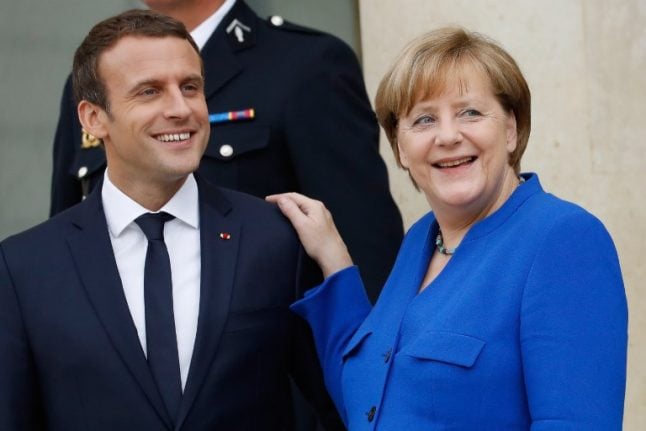ANGELA MERKEL
Macron outshines Merkel as EU’s top diplomat
Germany has for years longed for a stronger French partner, but may have got more than it bargained for as the self-confident Emmanuel Macron takes Europe's spotlight.
Published: 16 July 2017 14:36 CEST
Updated: 16 July 2017 16:37 CEST
Updated: 16 July 2017 16:37 CEST

German Chancellor Angela Merkel (R) and French President Emmanuel Macron leave the Elysee Palace in Paris on Thursday after an annual Franco-German Summit. Photo: PATRICK KOVARIK / AFP
Striking images from Paris this week offered signs of how Europe's de-facto leadership has started to mutate in the two months since Macron took office.
The 39-year-old French president welcomed US President Donald Trump to Paris for dinner in the Eiffel Tower and the traditional July 14th military parade.
The smiles and glad-handing between the two men contrasts starkly with Trump's dour relationship with German Chancellor Angela Merkel.
The abiding image thus far has been his apparent refusal to shake her hand on her first Washington visit following his inauguration — and the tensions remained on display at this month's G20 summit in Hamburg which Merkel chaired.
Macron has also reached eastwards, hosting Russian leader Vladimir Putin amid the spectacular surroundings of Versailles in late May.
Macron is showing that “France is back in the game,” said Jean-Dominique Giuliani of the Robert Schuman foundation, a specialist European think-tank.
“There's a rebalancing — which was necessary — of the relationship with Germany,” he added.
Leader of the free world?
Merkel until recently was alone on the European stage — even being hailed as the new “leader of the free world” by some English-language media after a 2016 that brought Brexit and Trump's shock election victory.
In typically German fashion, the chancellor herself has never laid claim to leadership in Europe — a position that would instantly trigger dark accusations about the country's past.
If she had the mantle of leadership cast upon her, it was partly because of the lack of a plausible counterweight in France, which for decades partnered Germany as Europe's political dynamo.
Struggling economically compared with a thriving Germany and led by the unpopular Francois Hollande, France was long eclipsed by its neighbour.
Britain, the EU's other major actor, quit the field of play with a referendum vote last year to leave the bloc.
Elsewhere, Poland's voice holds less sway as it faces accusations of drifting towards authoritarianism, while Spain and Italy remain economically anaemic.
Macron's arrival in the Elysee Palace as a committed pro-European has roused hopes of a return to the Franco German double act, which forged European integration and created the world's biggest trade bloc.
But his vibrant personal style and showcasing of France have also caused some to ask if he would really prefer to be solo.
“The Germans were surprised when Trump's visit to Paris was announced,” a diplomatic source told AFP.
“Macron wants to use this gesture to flatter the American president and make a name for himself as leader of Europe,” commented German magazine Der Spiegel in this week's edition.
By comparison, Merkel has opted for a somewhat tougher course with Trump, criticising the protectionist rhetoric that brought him to power and his decision to abandon the Paris climate accords.
Relationship test
Macron, too, has been an open critic of Trump's policies, especially on climate. However, he “didn't greet Trump by rolling his eyes and giving a sermon like Chancellor Merkel at the G20, but with a spectacular military parade, with dinner at the Eiffel Tower, with friendly words and much manly back-slapping,” commented Swiss daily Neue Zuercher Zeitung.
“It suggests that Macron could become the EU's top diplomat, displacing Merkel from a role she never really wanted,” the paper continued.
For now, bashing the US president — a massively unpopular figure in Germany — serves Merkel's domestic political purposes ahead of parliamentary elections in September, when she hopes for re-election to a fourth term.
And a more balanced power arrangement is a relief to Germany, conditioned by its Nazi past to shy away from sole leadership in Europe.
Macron and Merkel may have conflicting styles, but right now this does not appear to affect the substance of European leadership. Both are wedded to the goal of consolidating the European Union, which faces internal stress from nationalism and the external challenges posed by Brexit and the “America First” Trump.
But their relationship will face a critical test after the German elections, when talks on reforming the euro single currency build up steam.
At that point, potentially deep divisions between Berlin and Paris are likely to emerge — and it will take more than media-friendly images and rhetoric to bridge them.
Url copied to clipboard!



 Please whitelist us to continue reading.
Please whitelist us to continue reading.